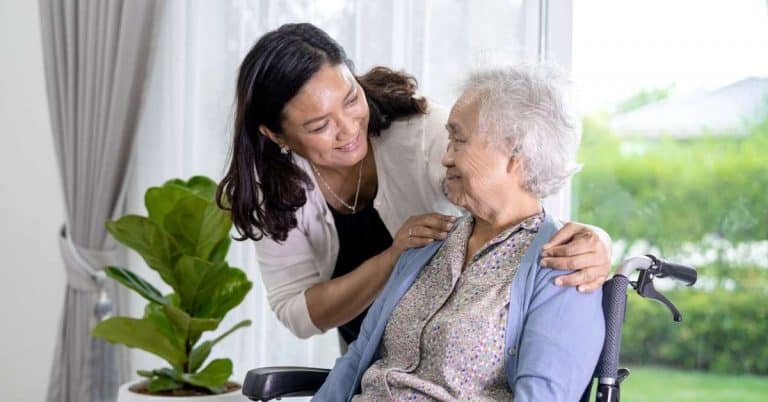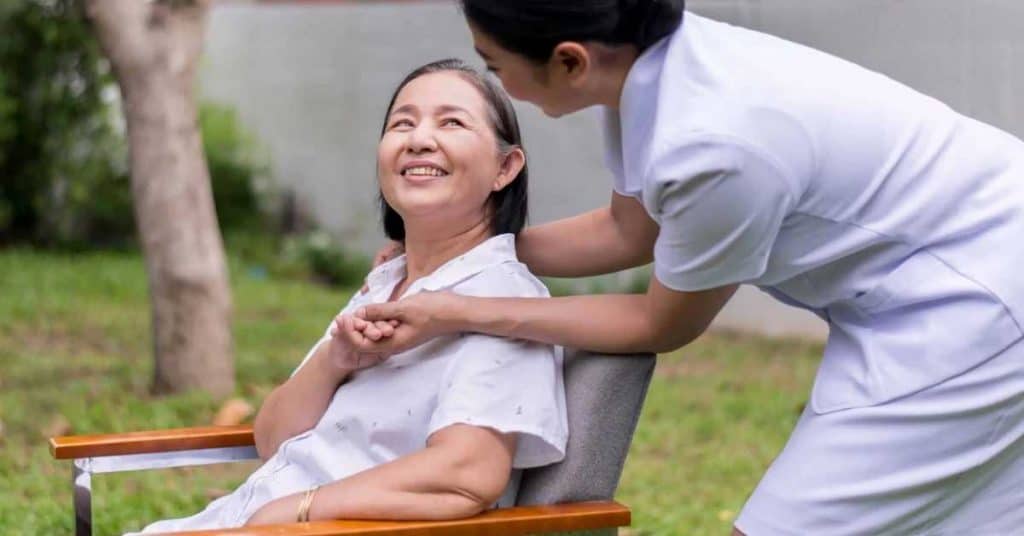Dementia is a general term that refers to degenerative neurological problems that affect a person’s memory and cognitive function, and thus all aspects of overall mental, emotional, and physical well-being. The disease is progressive, which is to say it deteriorates over time and is irreversible.
Although there is no definitive cure for the disease, dementia patients can manage symptoms and live their lives to the fullest with the right care and support from medical professionals and their family. Dementia care at home has proven to be one of the most useful options for people dealing with its debilitating effects, as dementia patients tend to do better in a familiar environment. However, caring for someone with dementia at home can be stressful for family members, especially when symptoms become serious and the patient becomes highly dependent.
In this in-depth home care guide for dementia in Singapore, we cover everything you need to know about dementia, its causes, symptoms, stages, and available treatment and care plans for this debilitating condition. We will focus on the important aspects of dementia care that family caregivers need to pay attention to, especially when your loved one is newly diagnosed and you are new to dementia care.
Table of Contents
1. Causes Of Dementia
There are a handful of factors that can cause dementia, including pre-existing health complications, age, brain health, and genetics. Contrary to popular belief, it isn’t a normal part of ageing and the causes may vary from person to person.
Although dementia does not directly cause death, the side effects put patients at risk for infections if they don’t receive the right treatment. There is no way to prevent dementia – instead, the most reliable choice is to lead a healthy lifestyle and maintain an active routine to help the mind and body function at optimal levels. At best, slowing down brain cell degeneration and managing symptoms are the only ways to directly deal with the disease.
2. Symptoms & Signs Of Dementia
People with dementia may experience a spectrum of symptoms and side effects depending on what stage they are at. Dementia is more common among elderlies and symptoms usually present themselves over the age of 65, but early on-set dementia is possible in someone’s 30’s, 40’s, or 50’s. Here’s a list of warning signs that could indicate your loved one may be experiencing the effects of dementia:
- Sudden memory loss
- Decreased cognitive function
- Confusion
- Lack of comprehension
- Misplacing belongings
- Stiff joints and muscles
- Poor reflexes
- Indecisiveness
- Personality & behavioural changes
- Short attention span
- Sleeping disorders
- Hallucinations
3. Types Of Dementia
Since dementia has a broad medical definition, it’s important to distinguish one type from the other during a diagnosis. There are five main variants of this disease, each with their own set of effects and complications:
- Alzheimer’s Disease - This is the most common cause of dementia which occurs through damaged nerve cells in the brain. It affects brain function and behavioural patterns, including memory loss and depression.
- Frontotemporal Dementia - This dementia starts from the frontal area of the brain, affecting speech, personality, and movement as a person ages.
- Vascular Dementia - This is the most common type of dementia in Singapore. It typically occurs after a stroke and is worsened by poor brain health in a patient. The sudden tissue loss causes memory disorders and difficulty in making analytical decisions.
- Dementia With Lewy Bodies - This type of dementia shows symptoms from both Alzheimer’s and Parkinson’s, causing shakes, tremors, stiff joints, insomnia, and delusions.
- Mixed Dementia - If a patient has two or more of the previous types of dementia, it’s considered a mixed diagnosis with multiple problems spread out through the brain and body.
Diagnosing Dementia
Doctors will look at a patient’s medical history and perform several neurological tests, brain scans, and psychiatric evaluations to confirm which type of dementia a patient has. Once a patient has been diagnosed by doctors, they will provide a clinical dementia rating based on their symptoms to recommend the appropriate treatment.
4. Stages Of Dementia
Dementia has seven levels of intensity, and determining the stage is crucial to determine appropriate treatment and care option for the patient. As dementia progresses, the brain cells incur more damage, triggering more symptoms to show up over time. That is why it is important to recognise the signs and catch dementia early so you can provide the appropriate treatment as soon as possible.
- Stage 1 - The first stage shows no signs of cognitive decline and individuals are still able to function at full capacity.
- Stage 2 - The second stage shows very mild cognitive decline with moments of forgetfulness or clumsiness that are easily overlooked by family and doctors.
- Stage 3 - The third stage reveals mild cognitive decline and people start developing more symptoms such as increased forgetfulness, inability to focus, lack of presence, and lapses in language skills. This stage can last from 2 to 7 years.
- Stage 4 - The fourth stage shows a moderate cognitive decline, and all previous symptoms are worsened by actions that interfere with their emotional, mental, and physical abilities. At this early-stage phase, they can’t be left alone to fend for themselves due to their frequent dementia-related episodes.
- Stage 5 - The fifth level is considered a mid-stage condition, showing more signs of major memory problems, physical dysfunctions, and feeling lost about times, places, and names. This can last for up to 2 years or less depending on the severity and requires consistent attention.
- Stage 6 - The sixth stage is much more serious, presenting severe cognitive decline that can last for up to 3 years. This phase induces anxiety, paranoia, obsessive compulsions, incontinence, and more episodes of forgetfulness. They may also experience difficulties speaking, counting, and handling their emotions.
- Stage 7 - The seventh phase is considered a late-stage condition, with patients no longer able to communicate or exercise their motor skills. At this point, patients require 24/7 care and assistance to do everything from walking, eating, urinating, defecating, dressing up, and taking medication.
A person is typically diagnosed with dementia when he or she has reached stage 4 or later. Earlier stages usually do not show enough symptoms for a dementia diagnosis. That is why a case of stage 4 dementia, despite being in the middle of dementia rating scale numerically, is considered to be "mild dementia" or "early-stage dementia". Stage 5 and 6 are known as "moderate dementia" or "mid-stage dementia", or "middle dementia". Stage 7 is referred to as "severe dementia", or "advanced dementia", or "late-stage dementia".
To detect dementia at earlier stages, individuals with risk factors and without symptoms can consider dementia assessment. Blood tests, professionally administered pen and paper tests, together with advanced brain scans can help catch early onset of dementia. Early diagnosis often helps with more prompt and effective treatment. Find out more about our dementia assessment tests here.
5. Treatment & Care For Dementia
Depending on the stage and type of dementia, the doctor may prescribe drugs and therapies to temporarily manage the symptoms or slow down the progression of the disease. The effect of drugs and therapies vary from individual to individual. At the moment, there is no known cure for the disease. A big part of dementia treatment, therefore, is palliative, which means that its aim is not curative but mainly to improve the quality of life for the patients. Learn more about what palliative care is and how it helps dementia patients here.
Dementia care can be provided at the patient's own home, a dementia day care center, or a dementia nursing home. The decision for care location is best made with the patients when they remain mentally sound. However, it also depends on the available resource of the family. If the patient wishes to be cared for at home but the family cannot ensure care and safety 24/7 for their loved one, placing the patient in a professional dementia care home could be a more viable option. Long-term dementia care cost is another important consideration, as the disease can last for years and the cost burden can add up to a significant amount. According to a survey, the average cost of care for a dementia patient in Singapore is estimated to be SG$40,000 a year.
Home care for dementia is a very popular choice, since it allows for families to keep their dementia loved one close by and take better care of the patient's unique needs. Dementia patients are also believed to manage better in a familiar environment. Financially, it can turn out to be less costly in the long run. If you opt for home care, there are a wide range of professional support to help you provide the best care for your dementia loved one right at home, ranging from house-call doctor and nurse, dementia caregiver, night respite care, to holistic palliative care service for dementia.
If you are debating between home care or nursing home for yourself or a dementia-affected loved one, check out our article on the pros and cons of each option here.
6. Ten Important Aspects of Home Care for Dementia
In the following section of the article, we focus on dementia care at home, including what to expect as the disease progresses and how to provide the best home care for your loved one with dementia. While home care is an effective way to help dementia patients manage their condition, family members and caregivers may find it challenging to provide quality care consistently for the loved one with dementia. Aside from medical care from healthcare professionals, here are 10 suggestions you and your family can do to provide holistic healing and improve the quality of life for your loved ones with dementia while they receive care at home. Holistic recuperation means caring for the mind and body along with the psychological factors that affect their overall well-being.
-
Understand the Progression of Dementia & the Challenges It can Pose to the Patient and Family Members
When dementia is first diagnosed, you might not notice any changes at first. During mild stage, a person with dementia can manage on their own or with the help of a helper or family caregiver as normal. However, they will become increasingly dependent as the disease worsens, unable to find their way home on their own, forgetting to take medication or taking it multiple times, or neglecting basic daily activities like bathing and eating. The loss of cognitive function can make their behaviours very challenging to deal with. They may become moody, aggressive, losing things and accusing others of stealing from them. Family and friends may find it frustrating to even talk to someone with dementia, thinking their loved one has changed.
Being aware of the natural progression of dementia will help you better navigate the dementia care journey. For example, the knowledge helps you understand that behavioural changes are inevitable as the condition develops, and that deep down your loved one has not changed. You will also know quickly that you need to start tracking the dementia parent when they wander out on their own and get lost. Or you can decide effectively when nursing care or professional caregiving service is necessary to support and supervise medication and daily self-care activities for the patient. To know more about the daily challenges faced by dementia caregivers and home care tips from professional dementia nurses, check out our dementia care article series here.
-
Establish Routine to Help Dementia Patients Better Manage Daily Activities
Routine and familiarity are important for dementia patients. Home environment where the persons with dementia has been used to for years makes it easier for them to locate daily items and navigate around. A new environment and new faces around may further confuse and disorientate them. This has been proven in a number of studies, where researchers pointed out that familiar surroundings could reduce confusion and wandering behaviour in dementia patients.
For family members, caring for a person with dementia at home also allows them to decorate the space to what is preferred by their loved one. This could be of emotional significance for the family.
-
Adjust How You Talk to and Interact with Your Dementia Loved One
As dementia worsens, the patient's language ability deteriorates. People with dementia will find it increasingly challenging to communicate and understand what is communicated to them. This can easily escalate into frustration for family members and caregivers, making them start shouting, 'scolding', or turning angry at their dementia loved one. The dementia-affected person could feel belittled and resentful as a result.
It is therefore important for family members and caregivers to adjust their communication style when talking to or interacting with your dementia loved one. Using short, simple sentences, communicating with empathy and lots of patience helps both the dementia patient and the family member. However, experts advise against talking and treating a dementia person like a child. In fact, helping people with dementia maintain their dignity and sense of self contributes to improving their quality of life. For more tactics on how to talk to and deal with a person with dementia, check out dementia home care tips shared by Ninkatec professional nurses specialising in dementia care here.
-
Spend Time With Loved Ones
Helping patients completing daily tasks and keeping them mentally engaged is a vital part of dealing with dementia. With a caregiver or helper, family members sometimes do not feel the need to get involved. However, spending time to help dementia loved ones perform simple tasks can improve bonding and relationships, which is important to the well-being of people with dementia. Examples include being around or showing encouragement to your dementia loved one while he or she is performing the daily tasks.
-
Stimulate the Mind of Dementia Loved One with Activities such as Games, Music And Art Therapy
Whether a patient is in the early or middle stages of their condition, a study shows that music and art therapy may be quite effective for dementia patients. Keeping them engaged with activities such as games, baking, cooking, or music and arts allows them to express their feelings and process any negative emotions or frustration. This could also potentially slow down the cognitive deterioration of the brain and help the brain form new connections through the senses. Here are top recommended activities for dementia patients which you can also participate in for additional bonding.
-
Manage Dementia Symptoms through Palliative Care
Dementia symptoms and dementia care needs vary widely from person to person, through dementia stages, and particularly among elderlies with complications caused by old age and existing conditions. Watch out for symptoms such as choking, difficulty swallowing (dysphagia), difficulty speaking (aphasia) during the mid to late stages and promptly get professional care to avoid complications. If the symptoms are complex to manage, for example involving both physical and mental aspects, it is best to engage the service of a multidiscipline palliative care team. The palliative team often comprise of doctors, nurses, therapists and other licensed health professionals who specialise in pain and symptom management. Home care is often the preferred setting for dementia palliative care because care can be best tailored to the needs of the person with dementia.
-
Prioritise Caregiver Self-Care with the Help of Professional Dementia Care Services
As dementia reaches advanced stage, a dementia patient often needs 24/7 supervision. This is a big responsibility for the families, and many feel they aren’t equipped with the right knowledge and skills to care for their loved ones. Family caregivers for dementia have reported feeling stressed, even burnt-out. Note that the care burden for dementia caregivers is often immense and long-lasting. Self-care is important and should be prioritised. And this is when you can call on professional home dementia care services to help.
Available on-call home care services include respite care, i.e, temporary care, nursing care, ie, care involving nursing procedures and medication administration, professional dementia caregiver and more. With the application of medical technology in dementia care in Singapore, round-the-clock dementia care is made possible and affordable. Healthcare professionals can be promptly available to assist dementia patients and their families when medical interventions are required, while family caregivers continue to provide maximum comfort and personal care at home.
-
Prepare for End Of Life Planning
A lot of families dealing with dementia patients find themselves grieving over losing connections with loved ones. The disease makes it difficult to reach out, communicate, and spend quality time once it has reached advanced stage. When patients undergo home care, they will have more quality interaction time with their loved ones. Take advantage of the time when the patient is still mentally sound and the personal space you have at home to help your elderly loved one feel comfortable and free to express themselves. Ask for their preference and wishes, including discussing plans for when the patient becomes incapacitated and end of life scenario. Though a difficult topic to talk about, it often brings the dementia patient and family peace of mind, knowing that they are being cared for according to their wishes.
-
Ensure Proper Nutrition for the Dementia Patient
Loss of memory and cognitive function, loss of appetite, less active lifestyle, medication side effects and other factors can result in poor nutrition for individuals with dementia. This can cause weight loss, malnutrition and compromised immunity, making an elderly with dementia more susceptible to infections and diseases. Prevent this by ensuring a well-balanced and nutritious diet for your loved one and help them eat better with tactics like providing more finger foods and snacks, or using herbs and spices in cooking. Check out our nutrition guide for dementia patients for more diet ideas here.
-
Reach out to Community Support Groups
Dementia makes it incredibly difficult for anyone to socialise and maintain relationships, but community support groups could help fill the void for both patients and caregivers. Though each dementia caregiver has their own experience, many people caring for their parent or spouse with dementia report common feelings such as frustration, anger, and even guilt. For the patient themselves, one thing to take note of is that public settings may cause stress to the patient since people with dementia prefer to be in familiar places. If a patient is receiving home care, the caregiver, patient, and family will benefit from the following online communities and support groups:
- Dementia Friendly Singapore
- PatientsEngage
- O’Joy Care Services
- Samaritans of Singapore
- Dementia Singapore Helpline
7. The Best Dementia Care In Singapore
There are a variety of trustworthy clinics, hospitals, and care centres that accept dementia patients at different stages in Singapore. In selecting the best dementia care for your loved one, it’s important to keep in mind the patient's wishes and preference. Take into account your resources as well, and plan in advance for more serious stages when the patient is prone to dangerous scenarios, requiring medical supervision for up to 24 hours a day depending on the situation.
The best dementia care after all is what works best for you and your loved one. Take the time to find out as much as you can about the disease, research care options, consult healthcare professionals and talk to people you know who go through the same experience before making your choice. However, be flexible to make adjustment when unexpected circumstance arises as well.
8. Ninkatec's Dementia Care Plans at Home
As one of the most trusted caregiving companies in Singapore, Ninkatec partners with highly esteemed medical professionals including nurses, caregivers, physicians, therapists, and doctors. Using a balanced combination of modern technological tools and human touch, Ninkatec provides the utmost care to make patients feel loved and understood every step of the way. With a team of in-house doctors, psychiatrists, on-call caregivers and licensed health professionals, Ninkatec has curated an extensive range of services to assist patients with dementia and other debilitating illnesses.
Ninkatec has three care plans that cater to different needs depending on the severity of a patient’s condition. Whether they need minimal assistance, regular visits, or intensive care, Ninkatec offers innovative and flexible solutions for everyone.
Virtual Care
The ‘Virtual Care’ plan is ideal for patients with mild symptoms of dementia who are still capable of looking after themselves. Ninkatec ensures optimum care by providing customers with 24/7 access to online clinicians for assessments and guidance. For an affordable monthly subscription, patients can experience the ease of use via chat for scheduling check-ups, appointments, and real-time virtual monitoring.
Close Connect
The ‘Close Connect’ plan is a weekly subscription for patients with moderate cases of dementia. This care package includes daily visits from nurses and live monitoring along with an online call centre that’s available for service 24 hours a day. The plan allows caregivers to ask questions from an on-call team of clinical experts so patients can fully benefit from medical advice at any given time.
Right At Home
The ‘Right At Home’ is perfect for patients diagnosed with severe dementia in the later stages. The package utilises special equipment to provide medical supervision and a reliable nurse to monitor vital signs at all times. This service will also include online assistance, monthly doctor’s visits, and more intensive caregiving. It’s a monthly subscription that will save the family lots of money and the patient gets to relax in the comfort of their home.
9. Takeaway Message
Caring for someone with dementia is a tedious and challenging task, but helping a loved one cope is the best gift you can give them. The most important factor to consider is giving dementia patients a lot of attention, care, and compassion to ease their suffering in as many ways as possible.
By hiring a professional caregiving service, you can drastically improve your household’s situation as the patient continue to receive medical treatment in the comfort of their home. Family members will also feel more hopeful knowing that their loved ones are well-taken care of at every stage of the disease. When you choose Ninkatec, we guarantee that you will be giving your loved ones the highest quality health care in Singapore.









